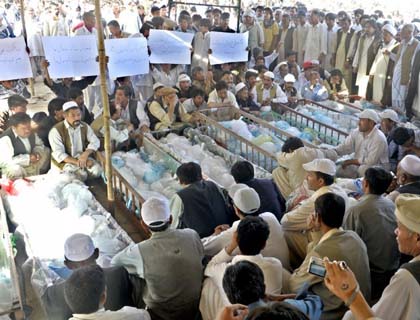It is for many decades that Hazara people have been living in Pakistan. They have dedicated holy services in different areas of civil services and military forces. They are well known for their hard work, dedication to education and civilization. They mainly inhabit in Quetta, the capital city of Baluchistan which is a multi-cultural zone where many ethnic groups with different religious ideologies are living together. There used to be no controversial issues and the civilians used to live in peace and friendly manners.
But gradually, the security situations along with the political scenario seem to be altering. The people are no more viewing each other as brothers and communities during different occasions are being targeted. The people, particularly of the minority groups, are living in a state between fears of death and hope of life.
The scenario in Pakistan is quite distressing; the leaders instead of forming strategic solutions to get the state out of danger are more struggling to defend their seats. Viewing the round tables on Pakistani media, we can note nothing else except a sort of political war and participants of the talks have got nothing else rather than blaming each other. The state is burning in sectarian and ideological fire and the leaders are busy om campaigning for the safety of their seats. There is no single part of the country where civilians can feel comfortable free of death threats and every single minutes of civilians’ life is passing in fear.
There is no city in Pakistan where civilians are not being killed as result of sectarian and ideological conflicts, but the case in Quetta is quite different. In Quetta, the only people who are viewed to be Shia are Hazara minority. The distinct physical appearance of these people makes them more vulnerable and easily distinguishable.
The religious extremist assailants on different occasions have been selectively targeting the members of Hazara minority since 1998, the start of genocide cleansing of Hazara minority in Quetta, Baluchistan. The figure of causalities since 1998 has crossed eight hundred. There are families who have lost numbers of their family members as a result of collectively being targeted in a single minute. The situation of Hazara community in Quetta is beyond tolerance and it is even getting worse by the passage of a single day.
Waves of targeted attacks on minority communities such as Hazara ethnic group in Pakistan have raised questions about the nature of these crimes. Some analysts label them as a wave of sectarian violence between Shias and Sunnis while others warn of a systematic targeting of this ethnic minority. The blurred scene on the screen is confusing, because the government officials have been trying to label the incidents noting more than sectarian conflicts, but considering the attack scenes in Baluchistan where the members of Hazara ethnic minority are being selectively distinguished and slaughtered brutally is beyond sectarian conflicts.
Because, it is not only Hazaras who believe in Shia sect, so, why are the Hazaras targeted only? And what is the Pakistani government doing to protect minority groups? Despite the clarity of the scenes and claiming the responsibilities of the targeted attacks on Shia communities by the religious armed groups in the country such as Lashka –re-Jangavi and Sepah-e- Sahabeh, the security establishment of the country has not taken any practical initiations to protect the minorities yet.
The community is being pushed behind the walls of misfortunes by being targetted during different occasions. The community had been experiencing frequent attacks during the era of 1998 to 2011, but the targeted attacks on this poor community crossed the normal range since May, 02, 2011, when the leading master mind of Alqa-e-da network (Osama bin Laden) was assassinated in Pakistan by US Special Forces.
Following his death, the LeJ spokesman from an unidentified location who identified himself as Ali Sher Haideri threatened to avenge the killing of their leader Osma bin Laden and the poor Hazara community members and localities were the first revenge attacks’ victims. The community has lost about 100 of their beloved members as a result of several attacks since May, 02, 2011. The victims of the incidents are mainly women, children, political leaders, civil service clerks, business men, students and teachers.
Since May, 02, 2011, there is no single day which is not the witness of Hazaras shedding tear for losing their beloved community members. The community after finger count of some days of resting in peace once again got the featured headlines of the Pakistani mediaa. During the last two weeks, the community has lost around thirteen innocent beloved members as the result of different targeted attacks.
Sectarian and ideological conflicts have long featured the top headlines of Pakistani media. Sectarian insurgencies have long been burning minorities such as Hazara community in fire and unfortunately there has not been any initiation taken by government to protect this poor community of civilian.
The failing security arrangements have created fear among the civilians in Pakistan, especially in Baluchistan province which has witnessed several attacks that have killed thousands of innocent people up to now. The targeted attacks are particularly done against the minority groups.
Despite worldwide demonstrations against the insurgencies in the country, the government of Pakistan has not taken any practical action yet to protect its civilians. The province is burring in sectarian violence, this is what most of the civilians have been reporting to the media but it seems like the civilian voice is falling on deaf ears and there has been no government official raising voice to pressurize the state’s security establishment for taking action.

